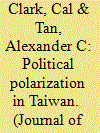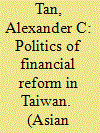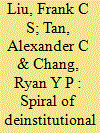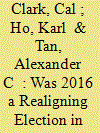| Srl | Item |
| 1 |
ID:
175410


|
|
|
|
|
| Summary/Abstract |
In a world of globalized markets, sizeable core states gain greater benefits from economic integration. Small peripheral states generally increase in trade incomes yet at cost of sovereignty and agenda decisions. Recent studies in the field of political economy have demonstrated that concerted economic integration efforts actually lead to disproportional gains for bigger powers at the expense of smaller neighboring states. This differential in integration benefits results in political disintegration for the latter.1 In the case of Asia Pacific, Taiwan is situated at the forefront of regional superpower China’s unification campaign. We examine the history of Taiwan’s cross-Straits relations highlighting its experience with China’s various forms of power. For other smaller states in the region, what lessons can be learnt from Taiwan’s experience in the last few decades characterized by China’s “peaceful ascendance” and regional bloc initiative? We suggest that Taiwan serves as a reference for other states in the region. We discuss on the implications of China’s economic integration projects, such as the Belt and Road Initiative (BRI) and the role of Taiwan in the political economy of regional relations. Not only can its experience provide reference data for other small states like canary in the mines,2 but it can also be a facilitator of synergetic strategies among smaller state to broker new possibilities under China’s expansive influence.
|
|
|
|
|
|
|
|
|
|
|
|
|
|
|
|
| 2 |
ID:
114783


|
|
|
|
|
| Publication |
2012.
|
| Summary/Abstract |
This article argues, that the bitter division between the two major parties in Taiwan is not really reflected in the electorate, despite an increasing polarization of politics in Taiwan over the national identity issue. The authors seek to explain this paradox by examining the changing nature of political parties, in particular the growing role of ideological activists in campaigns, the rise of cultural and identity issues, the difficulty for new parties to emerge, the decline of catch-all parties, and the tendency for major parties to engage in cartel activities.
|
|
|
|
|
|
|
|
|
|
|
|
|
|
|
|
| 3 |
ID:
092638


|
|
|
| 4 |
ID:
157686


|
|
|
|
|
| Summary/Abstract |
As political scientists start applying the complex-system approach to study party politics and as business scholars start to apply communication theories to study deinstitutionalization, we prospect a new possibility to study and explain politics within a political party. This study employs a systematically collected field observation data to evaluate Clemente and Roulet’s (2015) “the spiral of deinstitutionalization” framework. Based on analysis of news events and internal reports within Kuomintang from April 20 to October 17, 2015, we believe that this framework facilitates explanation about how the decision of nominating Hung Hsiu-Chu as the party’s first female presidential candidate was replaced three months before the Election Day. We interpret the whole story and provide details that contribute to enriching the framework for future organizational and political party research.
|
|
|
|
|
|
|
|
|
|
|
|
|
|
|
|
| 5 |
ID:
176132


|
|
|
|
|
| Summary/Abstract |
The January 2016 presidential and legislative elections in Taiwan produced a dramatic and unprecedented victory for the Democratic Progressive Party over its long-time rival, the Kuomintang. The party had never had a parliamentary majority before 2016. The elections indicated the potential for fundamental change in Taiwan’s party system. This is what political scientists call a critical realigning election. The problem with identifying these elections, such as the 1896 and 1932 ones in the United States, is that we can only be sure of such an interpretation after a significant amount of time has passed. Still, some of the changes in Taiwan are fundamental enough to make such an evaluation worthwhile. We summarize realigning elections; discuss the factors that may lead to a change in the partisan balance; and describe the growing role of protest parties and social movements in Taiwan politics.
|
|
|
|
|
|
|
|
|
|
|
|
|
|
|
|